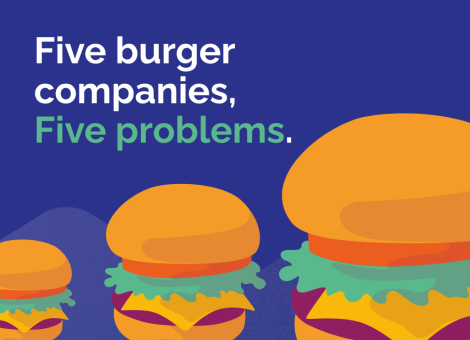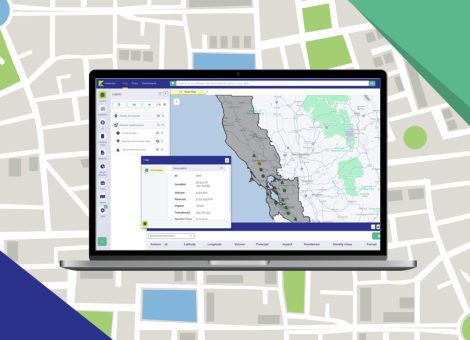Celebrating World GIS Day 2022: from education to careers in geospatial
World GIS Day is a celebration of all things related to the visualization of geographic data.
As leaders in this space, many of our team have dedicated their lives to equipping themselves with the expertise to help some of the world’s most successful brands understand their markets.
Three members of our team – Bill Dakai, Brian Strickland, and Dustin Stancil – received their master’s degrees in Geography from the University of North Carolina at Charlotte. There, they concentrated their studies in Location Analysis – a move that would set their course firmly in the direction of Kalibrate several years later.
For World GIS Day, we asked Bill, Brian, and Dustin to share some recollections of their course and thoughts about the direction of travel for the next generation of geospatial professionals.
What first attracted you to the Location Analysis Program at UNC-Charlotte?
Brian – I attended UNC-Charlotte as an undergraduate and discovered my passion for geography, specifically location analysis during my freshman year after taking an Economic Geography course taught by Dr. Dennis Lord. At that time, I didn’t realize that I was taking a class led by an expert in the field of location analysis. He ignited my passion for the field through his extensive knowledge and identifying potential career paths for me.
Dustin – I presented a paper at a conference regarding the impacts to local/small businesses when Wal-Mart opened in small towns. I was approached by two professors, Dr. Tink Moore and Dr. Dennis Lord, about attending UNC-Charlotte for their Location Analysis program. I had not even considered graduate school until that point. When they outlined the career paths that graduates had taken using tools they learned in that program, I was hooked.
Bill – My undergraduate geography professor suggested that I attend UNC-Charlotte’s Location Analysis graduate program as it was the best in the country. I was lucky enough to take a Retail Location class during my freshman year at Framingham State University – that got me hooked into thinking spatially.
When did you realize working with data through a geographic lens was a viable career option?
Brian – During my first year of graduate school, I worked as a GIS Analyst for a real estate development company. This was my first opportunity to apply my knowledge and skills in the real world, and I impacted the company’s results. During my tenure, I significantly the process of evaluating markets for clients and helped identify several sites for retail development. It didn’t feel like work, it was exciting and enjoyable. After that experience, I knew I wanted to pursue as a career.
Dustin – During undergrad at ECU I worked under the tutelage of Dr. Derek Alderman who helped me understand the true scope of how one can leverage geospatial knowledge in both the public and private sectors. He pushed me out of my comfort zone and encouraged me to apply to UNC-Charlotte to find a career path through the economic geography lens. Working with professors like Dr. Lord and Dr. Bill Graves at UNC-Charlotte really laid the foundation for opportunities in the location intelligence field.
Bill – Dr. Dennis Lord was well connected with leaders within retail site selection. He always let us know about job opportunities and was able to connect many of his students with great, practical thesis projects working with many of the nation’s top retailers.
What did you learn that you still use?
Brian – Wow, I learned so much, but here are a few skills that I use daily. First, have a curious mind. How can data be leveraged to answer a question or solve a problem, specifically using quantitative methods? As a geographer, how can I bring a spatial perspective to answering a question or solving a problem? Through the coursework at UNC-Charlotte, we had the opportunity to learn various techniques for working with geospatial data, including technical training in GIS. This provided me with a strong foundation and led me to where I am today.
Dustin – It really comes down to always asking the question, “why?”. A lot of what we call ‘old school methods’, aka gut feel, were still applied in retail location analytics. But what we learned through quant and spatial analysis is there are often data points that can help answer that ‘why?’ question. I’m constantly asking myself is there a geographic explanation to a question.
Bill – At the fundamental level, I learned critical thinking skills in relation to spatial data. We learned core GIS skills, how to estimate demographics, and how to apply quantitative methods to predict future outcomes. I have used these skills daily throughout my career.
What would you say to a young person considering further education or a career in working with geographic mapping or geospatial data?
Brian – I would say go for it! If you have a passion for geography, follow it, and it will lead to a rewarding career. You will need to work to understand the concepts and most importantly, how to analyze data that leads to actionable insights. Software and technology change but knowing how to leverage data to identify insights is a constant and in high demand. There are a lot of people that can create data visualizations and predictive models, but can they be used to answer questions and make an informed decision? That’s the key difference.
Dustin – Brick and mortar retail is moving at an unprecedented speed. Some skeptics might say that means its future is uncertain, but it’s just changing. The reality is the need for professionals with a spatial and analytical background is as high as ever. Existing retailers continue to reposition and optimize their footprint; new concepts of retail, experiential retail, are continuing to grow their physical footprint. If you have a passion for data and can connect that with a spatial mindset, there are countless opportunities.
Bill – I would suggest that they take supporting classes in programming and databases. The datasets we work with today are truly huge and you need to be comfortable working with terabytes of data.
What’s the most exciting trend in GIS today?
Brian – The significant increase in geographic data that is now available for analysis to answer questions and solve problems. Examples are Massive Mobile Data (MMD), GPS from connected devices, and aerial imagery. These sources and the continued development of tools used to analyze the data are super exciting and provide endless possibilities for the future.
Dustin – It’s really the amount of data that is out there now. It used to be just demographics, but you can now better understand spending patterns, leverage social media data, and mass mobile data (MMD). Getting ultra-focused on how to best serve the customer base through locations or micro-marketing is critical to maintain and strengthen your competitive edge.
Bill – The most exciting trend for me is getting to work with huge spatial databases regarding human movement. We just finished version 1 of the KLI Competitive Insights module, which I had a blast working on with the team. Being able to understand the interaction of people with retail locations has always fascinated me and now any retailer can have that data available at their fingertips.
Interested in a career working with GIS and geospatial data? See opportunities available at Kalibrate on our careers page.
To see how we use GIS to solve our clients’ most challenging questions, explore Kalibrate Location Intelligence. Happy World GIS Day!
Read more articles about:
Location intelligenceSubscribe and get the latest updates
You may unsubscribe from our mailing list at any time. To understand how and why we process your data, please see our Privacy & Cookies Policy
Related resources
Location intelligence
Five burger companies, five problems
These burger brands had challenges from international growth to understanding franchise locations cannibalization,...

Location intelligence
Market Optimizer: Demo video
Market Optimizer allows users to strategically grow their network in existing markets while balancing revenue...


